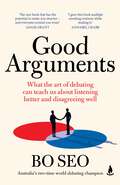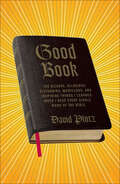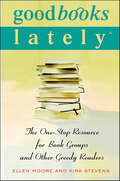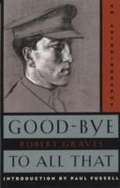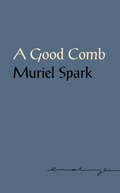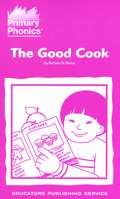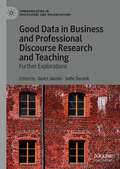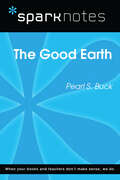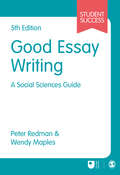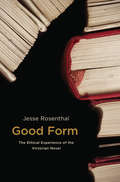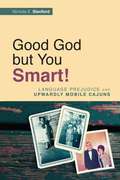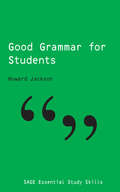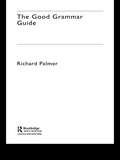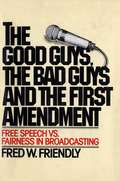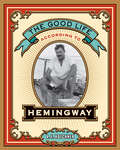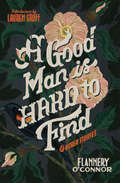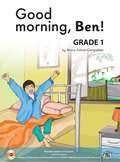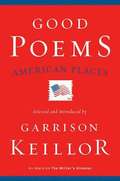- Table View
- List View
Good Arguments: What the art of debating can teach us about listening better and disagreeing well
by Bo SeoAt a time when every disagreement turns toxic, world champion debater Bo Seo reveals the timeless secrets of effective communication and persuasion.When Bo Seo was 8 years old, he and his family migrated from Korea to Australia. At the time, he did not speak English, and, unsurprisingly, struggled at school. But, then, in year five, something happened to change his life: he was introduced to debating.Immediately, he was hooked. It turned out, perhaps counterintuitively, that debating was the perfect activity for someone shy and unsure of himself. It became a way for Bo not only to find his voice, but to excel socially and academically. He went on to win world titles with the Australian schools and Harvard University teams.But debating isn&’t just about winning or losing an argument: it&’s about information gathering, truth finding, lucidity, organization, and persuasion. It&’s about being able to engage with views you disagree with, without the argument turning toxic.Good Arguments shares insights from the strategy, structure and history of debating to teach readers how they might better communicate with friends, family and colleagues. Touching on everything from the radical politics of Malcom X to Artificial Intelligence, Seo proves beyond a shadow of a doubt that, far from being a source of conflict, good-faith debate can enrich our daily lives. Indeed, these good arguments are more important than ever at time when bad faith is all around, and our democracy seems so imperiled.&‘From two-time world champion debater Bo Seo, a thoughtful, instructive and eloquent meditation on the art of debate and why its central pillars - fact-finding, reason, persuasion and listening to opponents - are so valuable in today&’s alarming ecosystem of misinformation and extreme emotion. When Bo Seo&’s family immigrated from South Korea to Australia, he was a shy, conflict-averse eight year old who worried about being an outsider, and in &“Good Arguments,&” he recounts how debate not only helped him to cross language lines, but also gave him confidence and a voice of his own.&’ Michiko Kakutani, former chief book critic for The New York Times.
Good Book: The Bizarre, Hilarious, Disturbing, Marvelous, and Inspiring Things I Learned When I Read Every Single Word of the Bible
by David Plotz“Hilarious . . . It’s CliffsNotes for Scripture—screenplay by Plotz, story by God . . . In the end, though, the book is made by the spirit of the writer.” —The New York Times Book ReviewAt a time when wars are fought over scriptural interpretation, when the influence of religion on American politics has never been greater, when many Americans still believe in the Bible’s literal truth, it has never been more important to get to know the Bible. Good Book is what happens when a regular guy—an average Job—actually reads the book on which his religion, his culture, and his world are based. Along the way, he grapples with the most profound theological questions: How many commandments do we actually need? Does God prefer obedience or good deeds? And the most unexpected ones: Why are so many women in the Bible prostitutes? Why does God love bald men so much? Is Samson really that stupid?“Like the Bible itself, Good Book contains multitudes—it is by turns thought-provoking, funny, enlightening and moving.” —A. J. Jacobs, New York Times–bestselling author of The Year of Living BiblicallyIrreverent . . . Plotz’s hilarious exegeses will have you laughing out loud. Who knew the Bible was such a riot?” —Time Out New York“Plotz is a genius writer.” —Franklin Foer, author of How Soccer Explains the World“A bloody good book . . . Very funny . . . Priceless for those of all traditions who see value in posing unanswerable questions to each other, and to God himself.” —Minneapolis Star Tribune“Deeply religious people might be offended by the book, but for the rest of us there’s a laugh on every page.” —Booklist
Good Books Lately: The One-Stop Resource for Book Groups and Other Greedy Readers
by Ellen Moore Kira StevensThe inside scoop on book groups--from the nation's leading experts!As book group members across the country have discovered, Ellen Moore and Kira Stevens know everything there is to know about book groups, and then some. The founders of the country's first book group consulting company, in Good Books Lately they dish out fun, stimulating advice based on their own experiences and those of hundreds of book group members on everything from:* How to start a group---and keep it going* How to tell a book by its cover (really!)* How to generate a lively discussion* Behind-the-scenes anecdotes, dirt, and favorite book lists* The best and worst book group books* Book group troubleshooting, no matter what sort of group you belong to* And much moreIf you're looking for new ideas to spice up your book group, wondering how to join an existing group, or hoping to start your own, Good Books Lately will give you the goods to make your book group experience a rousing, rewarding success.
Good-bye To All That: An Autobiography
by Robert GravesIn this autobiography, first published in 1929, poet Robert Graves traces the monumental and universal loss of innocence that occurred as a result of the First World War. Written after the war and as he was leaving his birthplace, he thought, forever,Good-Bye to All That bids farewell not only to England and his English family and friends, but also to a way of life. Tracing his upbringing from his solidly middle-class Victorian childhood through his entry into the war at age twenty-one as a patriotic captain in the Royal Welsh Fusiliers, this dramatic, poignant, often wry autobiography goes on to depict the horrors and disillusionment of the Great War, from life in the trenches and the loss of dear friends, to the stupidity of government bureaucracy and the absurdity of English class stratification. Paul Fussell has hailed it as ""the best memoir of the First World War"" and has written the introduction to this new edition that marks the eightieth anniversary of the end of the war. An enormous success when it was first issued, it continues to find new readers in the thousands each year and has earned its designation as a true classic.
A Good Cause (Reach Into Phonics Ser.)
by National Geographic Learning Nonie K. Lesaux Sylvia Linan ThompsonNIMAC-sourced textbook
A Good Comb: The Sayings of Muriel Spark
by Muriel SparkCelebrate the immortal Muriel Spark’s hundredth birthday by imbibing a delicious glass of her bubbly wit A Good Comb, a small gift edition of Muriel Spark’s brilliant asides, sayings, and aphorisms, is a book for sheer enjoyment. No writer offers such lively, pointed, puckish insights: “Neurotics are awfully quick to notice other people’s mentalities.” “It is impossible to persuade a man who does not disagree, but smiles.” “The sacrifice of pleasure is of course itself a pleasure.” “It is impossible to repent of love. The sin of love does not exist.” “She wasn’t a person to whom things happen.” “You look for one thing and you find another.” “It calms you down, a good comb.” Her scope is great and her striking insights are precise and unforgettable. This book will entertain you—it will even help you live your life. Drink in the pleasures of this little volume along with the benefits of taking up such advice as “Never make excuses but if you must, never make more than one—it gives the appearance of insincerity.” And “Beware of men bearing flowers.”
Good Data in Business and Professional Discourse Research and Teaching: Further Explorations (Communicating in Professions and Organizations)
by Geert Jacobs Sofie DecockThis edited book engages with the richly interdisciplinary field of business and professional communication, aiming to reconcile the prescriptive ambitions of the US-centred business communication tradition with the more descriptive approach favoured in discourse studies and applied linguistics. A follow-up to the award-winning book The Ins and Outs of Business and Professional Discourse Research (Palgrave Macmillan, 2016), this volume brings together scholars and their recent work from wide-ranging business and professional settings to engage with the question of what counts as good data. The authors focus on four key themes - authenticity, triangulation, background and relevance - to shine a light on business and professional discourse as essential contextual and intertextual. This book will be of interest to scholars working in applied linguistics, sociolinguistics, and business communication, but also other social scientists interested in a range of perspectives on oral, written and digital language use in workplace settings.
The Good Earth (SparkNotes Literature Guide Series)
by SparkNotesThe Good Earth (SparkNotes Literature Guide) by Pearl S. Buck Making the reading experience fun! Created by Harvard students for students everywhere, SparkNotes is a new breed of study guide: smarter, better, faster.Geared to what today's students need to know, SparkNotes provides:chapter-by-chapter analysis explanations of key themes, motifs, and symbols a review quiz and essay topics Lively and accessible, these guides are perfect for late-night studying and writing papers.
Good Eating: Assessment Pack (Great Minds Wit & Wisdom #Grade 2, Module 4)
by Great MindsNIMAC-sourced textbook
Good Essay Writing: A Social Sciences Guide (Student Success)
by Peter Redman Wendy MaplesWriting good essays is one of the most challenging aspects of studying in the social sciences. This simple guide provides you with proven approaches and techniques to help turn you into a well-oiled, essay writing machine. Good Essay Writing demonstrates how to think critically and formulate your argument as well as offering water-tight structuring tips, referencing advice and a word on those all too familiar common worries – all brought to life through real student examples from a range of subjects. Now in its fifth edition, this fresh update contains: New essay examples are analysed and discussed, so you have a clear understanding of what makes a good essay A new chapter on essay writing skills and other forms of social science writing, helping you transfer the skills you learn to different types of written assessments A new Companion Website providing additional exercises and examples, helping you practice and apply the skills. This practical guide is an absolute must for everybody wanting – or needing – to brush up on their essay writing skills and boost their grades. The Student Success series are essential guides for students of all levels. From how to think critically and write great essays to planning your dream career, the Student Success series helps you study smarter and get the best from your time at university. Visit the SAGE Study Skills hub for tips and resources for study success!
Good Form: The Ethical Experience of the Victorian Novel
by Jesse RosenthalWhat do we mean when we say that a novel's conclusion "feels right"? How did feeling, form, and the sense of right and wrong get mixed up, during the nineteenth century, in the experience of reading a novel? Good Form argues that Victorian readers associated the feeling of narrative form--of being pulled forward to a satisfying conclusion--with inner moral experience. Reclaiming the work of a generation of Victorian "intuitionist" philosophers who insisted that true morality consisted in being able to feel or intuit the morally good, Jesse Rosenthal shows that when Victorians discussed the moral dimensions of reading novels, they were also subtly discussing the genre's formal properties.For most, Victorian moralizing is one of the period's least attractive and interesting qualities. But Good Form argues that the moral interpretation of novel experience was essential in the development of the novel form--and that this moral approach is still a fundamental, if unrecognized, part of how we understand novels. Bringing together ideas from philosophy, literary history, and narrative theory, Rosenthal shows that we cannot understand the formal principles of the novel that we have inherited from the nineteenth century without also understanding the moral principles that have come with them. Good Form helps us to understand the way Victorians read, but it also helps us to understand the way we read now.
Good God but You Smart!: Language Prejudice and Upwardly Mobile Cajuns
by Nichole E. StanfordTaking Cajuns as a case study, Good God but You Smart! explores the subtle ways language bias is used in classrooms, within families, and in pop culture references to enforce systemic economic inequality. It is the first book in composition studies to examine comprehensively, and from an insider’s perspective, the cultural and linguistic assimilation of Cajuns in Louisiana. The study investigates the complicated motivations and cultural concessions of upwardly mobile Cajuns who “choose” to self-censor—to speak Standardized English over the Cajun English that carries their cultural identity. Drawing on surveys of English teachers in four Louisiana colleges, previously unpublished archival data, and Pierre Bourdieu’s theory of the legitimate language, author Nichole Stanford explores how socioeconomic and political pressures rooted in language prejudice make code switching, or self-censoring in public, seem a responsible decision. Yet teaching students to skirt others’ prejudice toward certain dialects only puts off actually dealing with the prejudice. Focusing on what goes on outside classrooms, Stanford critiques code switching and cautions users of code meshing that pedagogical responses within the educational system are limited by the reproductive function of schools. Each theory section includes parallel memoir sections in the Cajun tradition of storytelling to open an experiential window to the study without technical language. Through its explication of language legitimacy and its grounding in lived experience, Good God but You Smart! is an essential addition to the pedagogical canon of language minority studies like those of Villanueva, Gilyard, Smitherman, and Rose.
Good Grammar for Students (SAGE Essential Study Skills Series)
by Howard JacksonMany students set out in further and higher education with little grounding in the skills required for academic writing. This practical guide will give students a command of grammar, spelling and punctuation, enabling them to improve the quality and accuracy of their writing. The book includes: - the basics of English grammar - how sentences are structured; - help with spelling and punctuation; - tips on avoiding the most common mistakes and pitfalls; - advice on how students can improve their writing in essays, reports and projects. The book is packed with examples to illustrate points and highlight good and bad practice, and contains handy tips and student exercises. An indispensable companion for undergraduate students on any Social Science, Humanities or Arts degree course, Good Grammar for Students is also an ideal text for Study Skills modules at first year undergraduate level across the social sciences. SAGE Study Skills are essential study guides for students of all levels. From how to write great essays and succeeding at university, to writing your undergraduate dissertation and doing postgraduate research, SAGE Study Skills help you get the best from your time at university.
The Good Grammar Guide (Routledge Study Guides Ser.)
by Richard PalmerDoes grammar bother you? Does it first inspire boredom, then fear? Since the virtual removal of formal grammar teaching from our schools' standard curriculum forty years ago, such negative responses have increasingly characterised students and professionals alike. As this lively and user-friendly book sets out to prove, that is both unfortunate and unnecessary. Not only is grammar an enabling servant rather than a tyrannical set of absolute rules: it can also be fun. This light-hearted guide offers extensive coverage of Parts of Speech, Syntax, Inflection and Punctuation, along with a detailed look at common errors and misconceptions. Regular exercises are included, as is a baleful survey of Political Correct usage, whose desire to sanitize and control the way we speak is injurious to grammar, language itself and indeed the way we live now. The aim throughout this book is to reassure and entertain as well as instruct. This handy volume puts an amusing light on grammar, and as such it is guaranteed to banish boredom and fear. The Good Grammar Guide can also be read as a companion to one of Richard Palmer's other publications, Write in Style 2nd Edition, also published in Routledge's Study Guides series.
The Good Guys, the Bad Guys and the First Amendment: Free Speech Vs. Fairness in Broadcasting
by Fred W. FriendlyUnlike newspapers, TV and radio broadcasting is subject to government regulation in the form of the FCC and the Fairness Doctrine, which requires stations "to devote a reasonable amount of broadcast time to the discussion of controversial issues" and "to do so farily, in order to afford reasonable opportunity for opposing viewpoints." In this provocative book, Fred W. Friendly, former president of CBS News examines the complex and critical arguments both for and against the Fairness Doctrine by analyzing the legal battles it has provoked.
Good Habits Great Readers: Student Reader Volume 3
by Celebration PressThis Celebration Press Reading Good Habits Great Readers Student Reader-Volume 3 is for 4th grade students.
Good Habits Great Readers: Student Reader Volume 1
by Celebration PressThis Celebration Press Reading Good Habits Great Readers Student Reader-Volume 1 is for 4th grade students.
Good Habits Great Readers: Student Reader Volume 2
by Celebration PressThis Celebration Press Reading Good Habits Great Readers Student Reader-Volume 2 is for 4th grade students.
The Good Life According to Hemingway
by A. E. Hotchner“Scholars and [fans] will delight . . . provide[s] a window into the multifaceted mind of a literary giant. A tasty bonus is roughly 150 mostly rare pix.” —Library JournalIn the fourteen years that A. E. Hotchner traveled with Ernest Hemingway, he collected a lifetime's worth of Hemingway's experiences, anecdotes, and observations on the backs of matchbooks, napkins, and slips of paper. Speaking on everything from war to women to writing, Hemingway's words are at turns funny and poignant, revealing a rich portrait of the American literary giant and the world he took by storm.Complete with black-and-white photographs that cover nearly two decades of Hemingway's life, The Good Life According to Hemingway is an exuberant celebration of his remarkable genius and the chaotic adventure of his life.“[E]ntertaining.” —Publishers Weekly
A Good Man Is Hard to Find and Other Stories: And Other Stories
by Flannery O'ConnorThe collection that established O'Connor's reputation as one of the american masters of the short story. <P><P>The volume contains the celebrated title story, a tale of the murderous fugitive The Misfit, as well as "The Displaced Person" and eight other stories.
Good morning, Ben! class 1 - MIE
by Aruna Ankiah Gangadeen"Good Morning, Ben!" charmingly captures a slice of Ben's morning routine in a delightful Grade 1 narrative. As the sun brightens the day, Ben awakens to the chirping of birds and the sound of his brother's gentle snoring. Eagerly stepping out of bed, Ben greets his parents with a cheerful "Good morning!" in a heartwarming display of morning enthusiasm. Through its simple yet vivid illustrations and easy-to-understand language, the book beautifully portrays the innocence and joy of starting the day. It invites young readers to connect with Ben's experiences, prompting discussions about their own morning rituals, the sounds they hear upon waking up, and the customary greetings shared with family members.
Good Poems, American Places
by Various Garrison KeillorP> Another wonderful poetry anthology from Garrison Keillor-rooted in the American landscape. Greatness comes in many forms, and as Garrison Keillor demonstrates daily on The Writer's Almanac, the most affecting poems in the canon are in plain English. Third in Keillor's series of anthologies, Good Poems, American Places brings together poems that celebrate the geography and culture that bind us together as a nation. Think of these poems as postcards from the road, by poets who've gotten carried away by a particular place-a town in Kansas, a kitchen window in Nantucket, a Manhattan street, a farm in western Minnesota. Featuring famous poets and brash unknowns alike, the verses in this exhilarating collection prove that the heart can be exalted anywhere in America.
